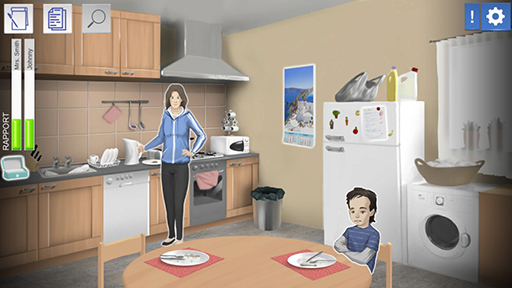The child interviewing simulator
The police game that was developed, the Child Interviewing Simulator (CIS) provides an interactive scenario (of approximately 30 minutes duration) where the player assumes the role of a police officer who is first on the scene of an incident in which a child is a witness. Within the game, the officer needs to interview a 9 year-old boy, who allegedly witnessed a woman being attacked on his way home from school (Hart et al., 2017; Margoudi et al., 2016).
The tricky topics of ‘Rapport’ and ‘Appropriate questions’ was built into the games architecture. There was also a feedback mechanism which informed the game player when there was an increase in rapport (i.e. the green bar went up). This rapport bar increased if the player chose appropriate responses which would increase the rapport with the child.
The game-based training (see video below) was provided as part of a randomized control trial across three different UK police forces during their 13–20 week ‘Initial Police Learning and Development Programme’. The trial consisted of the regular 3–5 day face-to-face witness training (control group) and the game-based training (experimental group). The time that the training was given was rotated to counter-balanced practice effects. That is, half were given the games-based training and then the face-to-face training and the other half were given face-to-face training and then games-based training. There were an equal number of men and women, the majority of whom were aged below 35.
Activity 1 Video of child interview
Go to IRIS Connect and go to the Activities tab labelled ‘Week 6, Activity 1’. You will see a video for a games-based child interview simulator. Answer the discussion questions in the discussion board below the video. The video can also be viewed here:

A tricky topic quiz was created and the quiz data was collected from a total of 116 of the new recruit police officers as part of a detailed evaluation of the trial. The tricky topic quiz results identified statistically significant findings for simulation trainings improvement in understanding compared to face-to-face training. The face-to-face training produced a decrease in understanding. This was thought to be attributed to the lack of specificity in the current training confusing the police when they had to deal with the specific issues of interviewing a child. The tricky topic approach supported a more detailed analysis of these findings. It was then identified that the game was specifically improving tacit understanding around rapport building with the child that was improving more than procedural understanding around completing forms appropriately.

